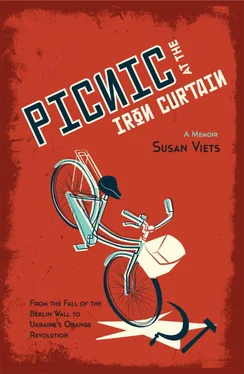Susan Viets
PICNIC AT THE IRON CURTAIN
A MEMOIR
From the fall of the Berlin Wall to Ukraine’s Orange Revolution
For my mother, Celia, and in
memory of my father, Digby
Many people in these stories have kindly given me permission to use their first names. When I was unable to reach someone, I used a pseudonym to protect that person’s privacy. I compressed timelines in some chapters. Chapter One stretches over two years. I met the women on the ward at different times, as I recovered from different operations. Chapter Four compresses two visits to Chernobyl. I first went with Swiss scientists in August 1990. My second trip was with Volodymyr Shovkoshytnyi in April 1991.
Picnic at the Iron Curtain is based on diaries, reporting notebooks, letters and memory. Chapter Ten relies heavily on news articles. These are listed in the Sources section.
Many of my friends read the chapters in which they appear, provided details about events that I described and helped catch mistakes. I struggled with the spelling of place names, particularly Kiev. The transliteration from Ukrainian is Kyiv but the more common practice is to write Kiev, so I used this spelling.
1

LONDON
I first travelled to the Eastern Bloc because of an accident in October 1986. I was hit by a truck while cycling in London and received a small settlement from the driver’s company. When Canadian friends visited me in hospital I described the truck. It weighed 16 tonnes and was part of a demolition fleet. I told them that the truck had rumbled too close behind as I biked home from my class at the University of London. My basket brimmed with jars of salsa, fresh chilies, tomatoes, black beans and all the other ingredients for tacos. I do not remember the moment of impact even though I remained conscious as it happened. I landed on my back on the sidewalk near Euston station. Clouds swept overhead. I stayed still for a while and then tried to prop myself up on my elbows, momentarily distracted by a bright green door across the street. Its brass knocker glinted in the sun. Groceries lay scattered on the ground. An ambulance arrived from Emergency. Paramedics took charge. As I told the story to British friends and relatives, different words slipped in. I was struck by a lorry, rode a push cycle, landed on the pavement. An ambulance attendant offered a gas mask. I resisted. She said, “Love, you’ll enjoy it. It’ll be like downing ten pints.” I next remembered a door swinging open at the University College Hospital Casualty Department. Then I woke up on the orthopaedics ward, in a cast from ankle-to-hip.
I was horrified when the surgeon explained that he would soon drill holes in one of my shinbones (I imagined him wielding the type of Black and Decker that lay in my parents’ garage) and install hardware to keep shattered bits of bone in place. A few days later when he next operated I was so high on painkillers that I felt quite calm. As I recovered, I became chatty in my drugged state and I made friends with other patients. Days passed, then weeks, and we bonded. Mrs. M., who had the bed directly opposite mine, sensed a romantic catastrophe.
“No letter from him again dear?” she inquired one day when she saw a stack of mail on my bedside table. I did not want to discuss it, so I just shook my head.
Most of Mrs. M.’s body lay hidden from view, swaddled in hospital sheets, just like mine. I could make out a large, lumpy figure and blue tinted hair. Mrs. M. had regular habits in hospital that included afternoon tea at three o’clock.
“Care to join me for a cup?” she always asked.
“No thanks,” I would answer.
She insisted that day, so I said yes. Mrs. M. sent a friend over with a porcelain cup. It contained a generous quantity of scotch.
Beside my mail stood a stack of university course books on the history and politics of Eastern Europe and the Soviet Union (I was studying for an M.A.), and a pile of magazines that chronicled current developments in that part of the world. I read all day and learned that Hungary — that small country on the edge of the Soviet Bloc — was one of the boldest to experiment with reform. Confined to bed, unable even to reach the bathroom, I travelled in my imagination as far as Budapest. I did not know how I would get there or when, but I wanted to visit Hungary to see the changes that had occurred first-hand.
Mrs. M. remembered Hungarian refugees who had fled the Soviet invasion thirty years earlier, in 1956. “I saw some of them at Paddington,” she said. “The poor dears they looked so lost, leaving behind their homes. Who knows what horrors they saw.” I wondered what she thought of all that time in bed. In my hospital cocoon the outside world receded and I dreamed.
Money helped turn those dreams into a plan. Another ward neighbour, Edith, who could not hear, delivered the good news. Edith usually wore a hearing aid in each ear. However, as she was ferried from another hospital to this one, both devices had disappeared. Anyone who wanted to talk to Edith had to shout.
Early one day Edith stood over a locker between our beds. She clutched envelopes.
In a loud voice I said, “Good morning, Edith, that’s my mail.”
She did not turn in my direction or respond in any other way. Instead, she took one letter and opened the envelope.
“Someone’s written from a legal firm. It’s about money,” she bellowed. Then she picked up her large white-rimmed magnifying glass, peered and shouted out the contents of the letter. I had won a small settlement from the trucking company for the accident.
The news spread quickly. Patients in nearby beds congratulated me. If she’d been there I’m sure Mrs. M. would have said, “When we’re out you’ll have to buy us all a round,” but she was not. She had disappeared in a bed shuffle. The ward was like that. Beds filled and emptied with no warning at all.
A few days after I underwent another operation, I noticed a new neighbour, a small and slender woman in her early eighties whom the nurses called Moira. She stood by her bed holding a pair of scissors and asked me if I would help take the hem down on her pink nightgown. I wondered how to respond to this unusual request. I told Moira that I would be happy to help but that I could not get out of bed because of my leg injuries. She shuffled over and gave me the scissors; I undid some stitches. Then I heard Moira call out, “Porter!” The surgeon, on rounds with his students, stopped.
Moira said to him, “Porter, please take my bags. I’m ready to check out.”
I put the scissors down and hoped that no one noticed the unpicked hem. Moira climbed back into bed. Really, though, I felt like her, ready to check out and get my life rolling again.
About a month later, a nurse appeared with a pair of crutches.
“Those are for me?” I asked hopefully.
“They are. It’s time for you to stand,” she said. “That’s all we’ll try today.” I shook from the effort because my muscles had atrophied.
“Don’t worry,” she said. “You’ll be walking again in no time at all.” She was right. Within days I hobbled down the ward and back again. I visited bedridden friends. My confidence grew. Soon I was ready for discharge and my first steps on the street.
Читать дальше















